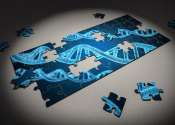Rare developmental disorder linked to tumor-suppressing protein
CHARGE, which affects 1 in 10,000 babies, is an acronym whose letters stand for some of the more common symptoms of the condition: coloboma of the eye, heart defects, atresia of the choanae, retardation of growth and/or development, ...
Aug 3, 2014
0
0





